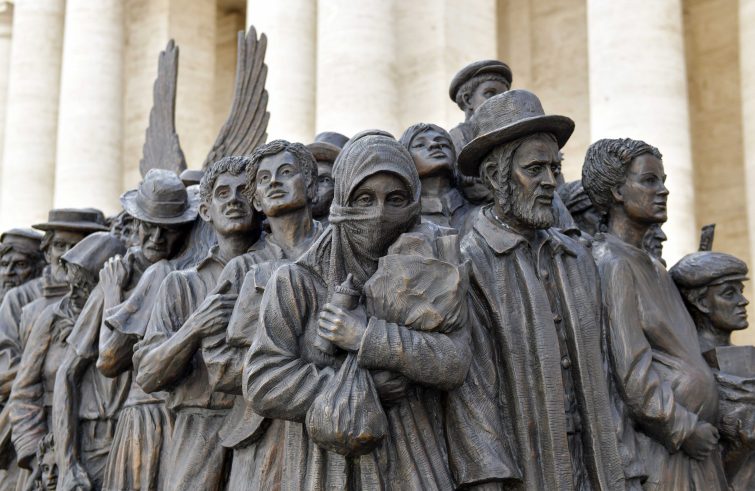
“Ours is a Church of itinerant people. We wish the Mediterranean were a sea of peace, not death. A meeting point between the northern and southern shores and with our Muslim brothers and sisters.” With these words Paul Desfarges, Archbishop of Algiers, presented to SIR his small Church in Algeria. On 41 million inhabitants Catholics constitute a minority of about 8,000 people, of whom only 1000/2000 are practicing Catholics. The majority are foreigners, mainly from sub-Saharan Africa, as well as Europeans expatriated for professional reasons. Monsignor Desfarges, born in Saint-Étienne in the Loire, France, naturalized Algerian, is one of the bishops from 20 countries bordering the Mediterranean attending the reflection and spirituality meeting “Mediterranean, frontier of peace”, to be held in Bari from 19 to 23 February, on the initiative of the Italian Episcopal Conference. He is a member of the delegation who will receive Pope Francis – during his visit on Sunday 23 February – to express a message of gratitude in his capacities as President of the Regional Conference of North Africa.
 Monsignor Desfarges, how would you describe the Church of Algeria?
Monsignor Desfarges, how would you describe the Church of Algeria?
It comprises faithful from many world regions. A few are Algerian Christians but the majority are foreigners, mainly from sub-Saharan Africa, as well as Europeans expatriated for professional reasons. Ours is a Church of itinerant people. We live in a country, like Libya and Morocco, that migrants seek to transit through in order to reach Europe. As a Church we have reflected on how to best live our presence in dialogue with our Muslim brothers and sisters and with migrants.
“We wish the Mediterranean were a sea of peace, not death. An area of exchanges between the northern and southern regions and with our Muslim brothers and sisters.”
What are your pastoral priorities?
Our Church was confirmed by the beatification of the martyrs of Thibirine. We seek fraternity of encounter. Our Church, while ministering to the spiritual life of the faithful, also pursues a living faith based on the encounter between Algerian Muslim brothers and sisters. We have our humanitarian and charitable services, libraries, school support centres. We meet in a simple and familiar way, we promote peace and non-violence, we express our closeness to Algerians in their quest for justice.
Just like Morocco and Tunisia, Algeria is a country of transit and departure of migrants towards Europe. What can you do for them?
Algeria is one of the routes that migrants attempt to cross. Many try to reach the Spanish enclaves of Ceuta y Melilla in Morocco, others try to leave from Algeria. We cooperate with international organizations such as IOM (International Organization for Migration) and other human rights organizations. As a Church we embrace the model of the Good Samaritan in our attitude towards our migrant brothers and sisters who knock on our doors and experience very difficult situations. If they are sick we provide treatment or help them receive treatment. We offer humanitarian services for migrants in situations of serious vulnerability, children or people with disabilities. We help them and refer them to competent bodies.
How do you feel when you meet a migrant person?
Every time I meet a migrant I am deeply moved by the spirituality of these people. The Algerian justice ministry allows us to visit Christian detainees in prisons, many of whom are migrants. They are people with a deep religious belief and are also members of our Church. I am pleased to be able to accompany them, also personally.
Can we think of a Mediterranean as a place that respects the rights and dignity of migrants, as the meeting in Bari calls for?
That’s a political problem. Every country has its own policy with regard to the migrant phenomenon. As a Church we are aware that this is a very painful phenomenon. Migrants are facing serious difficulties. We are making the initial humanitarian gestures that can bring some relief but resources are extremely limited. All Maghreb countries are facing a situation similar to ours.
That’ s why this first meeting between bishops from the northern and southern areas of the Mediterranean is so important: to see what the Church can do, in order to effectively contribute and cooperate with the Church communities that migrants belonged to.
Will Bari send a strong message to Europe asking for the Mare Nostrum to become a place of welcome and not of death?
Definitely. The concluding meeting with the Pope will be of fundamental importance. People are suffering, struggling, facing tragic ordeals, and we must all ask ourselves how best we can organize ourselves to welcome and integrate them.
We must not fence ourselves off, erect walls.
Countries on both sides of the Mediterranean should find ways to help migrants, people who have been through dreadful experiences, whether they can remain or be repatriated to their home countries if necessary, always with respect for humanity. They are human persons who have experienced terrible situations.
Do you already know what you will say to Pope Francis?
I haven’t prepared a speech yet. I will surely thank Pope Francis for his strong and evangelical words that touch, challenge, help, encourage and support us as we live in the peripheries. It will be an expression of gratitude, as the Pope reminds us that the Gospel can indeed find the solutions. Solidarity between countries is a path that must be pursued, we cannot lock ourselves in. The Pope reminds us of the humane in human beings: encountering our fellow other and embracing their difference, their mystery, regardless of nationality or religion, is an enrichment.










